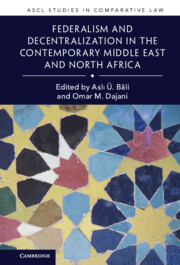Book contents
- Federalism and Decentralization in the Contemporary Middle East and North Africa
- ASCL Studies in Comparative Law
- Federalism and Decentralization in the Contemporary Middle East and North Africa
- Copyright page
- Contents
- Contributors
- Acknowledgments
- 1 Introduction
- Part I Theoretical and Comparative Context
- Part II Decentralization and Governance Reform
- 6 Decentralization, Ideology, and Law in the Islamic Republic of Iran
- 7 Salvaging State Legitimacy in Iraq through Decentralization
- 8 Decentralization Reforms in Post-Revolution Tunisia
- Part III Decentralization and Self-determination
- Part IV Decentralization, Conflict, and State Fragmentation
- Part V Conclusions
- Index
6 - Decentralization, Ideology, and Law in the Islamic Republic of Iran
from Part II - Decentralization and Governance Reform
Published online by Cambridge University Press: 15 January 2023
- Federalism and Decentralization in the Contemporary Middle East and North Africa
- ASCL Studies in Comparative Law
- Federalism and Decentralization in the Contemporary Middle East and North Africa
- Copyright page
- Contents
- Contributors
- Acknowledgments
- 1 Introduction
- Part I Theoretical and Comparative Context
- Part II Decentralization and Governance Reform
- 6 Decentralization, Ideology, and Law in the Islamic Republic of Iran
- 7 Salvaging State Legitimacy in Iraq through Decentralization
- 8 Decentralization Reforms in Post-Revolution Tunisia
- Part III Decentralization and Self-determination
- Part IV Decentralization, Conflict, and State Fragmentation
- Part V Conclusions
- Index
Summary
In 1999, the Islamic Republic of Iran established elected local government by holding nationwide elections for city and village councils. Competing actors hoped it would support distinct outcomes: Islamization, administrative efficiency, and democratization. This chapter describes the underlying logic of these motivations and their outcomes over the two decades since: in the main, the triumph of Islamization and technocracy. It explores the regime’s use of local government and administrative law to undercut the democratizing potential of political decentralization through two arenas of local politics. The regime controlled the scope of local political participation through widespread disqualification of opposition individuals and political parties. The regime also severely restricted the autonomy of elected local government in passing legislation. This institutionalized elected local government as a subordinate administrative tier of the regime rather than a local partner in subnational governance. The chapter concludes that political decentralization in Iran is best interpreted through the theory of electoral authoritarianism and is best viewed historically as an integral part of building Iran’s authoritarian Islamic state.
Keywords
- Type
- Chapter
- Information
- Publisher: Cambridge University PressPrint publication year: 2023

